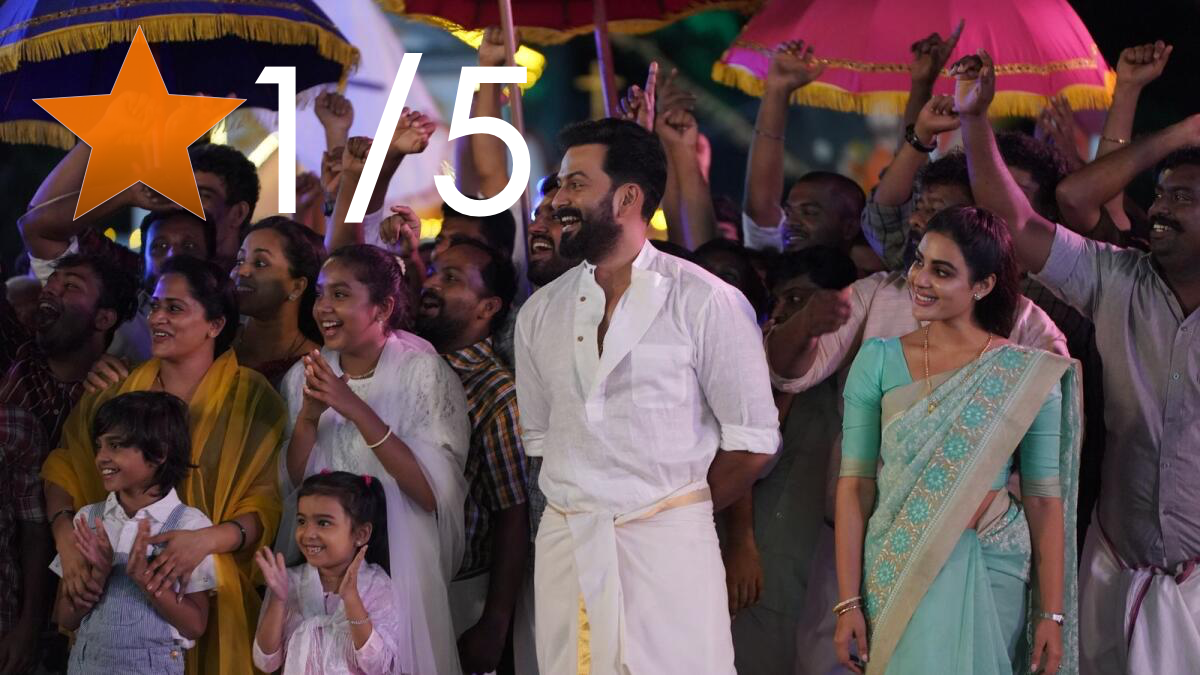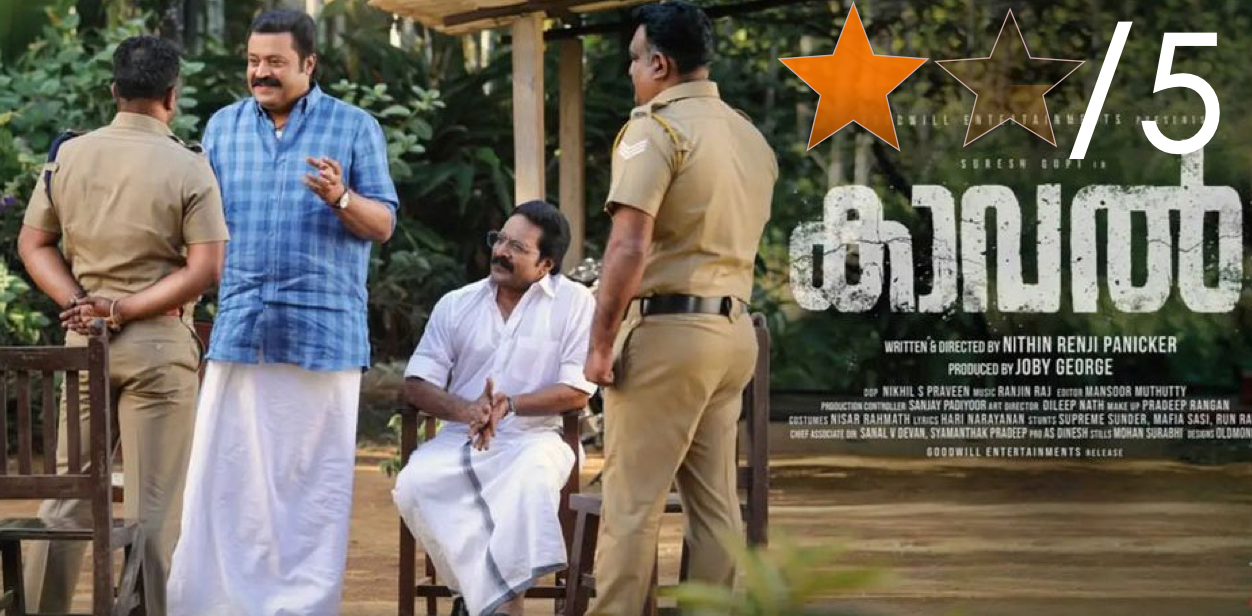Prithviraj disappoints. Then again I am back from watching Mohanlal’s Chinatown, so disappointment needs to be understood as occurring when there is hope left. Mohanlal cannot disappoint me anymore. Prithvi loses control at critical junctures in the movie. This is the same actor who gave extrememly controlled performances in Vasthavam and Thalappavu, but he loses it occasionally in “Urumi”.
A movie is much more than a screenplay or a story, and if the whole purpose of a movie is to tell a story, a novel or a short story would suffice, and when it comes to M.T. I wonder whether M.T.’s screenplays rise above turning the emotional knob. As someone put it, there is a distance between M.T.s Snow (Manju) and Orhan Pamuk’s Snow, a distance which some of us love to forget.

‘Urumi’ is an interesting new movie in the theatres which seems to have divided public opinion right down the middle. I am reviewing a movie here after a long time, and Urumi is a good pick because I am not a fence-sitter on this one. Even after discounting for a group of young people who would cry foul of any Prithviraj movie (‘avanu enthoru jadayanu’), and another group of people who are still stuck in the Mammooty, Mohanlal, Gopi era of superstars (fact is there are 3 super stars even today – Mammooty, Dileep, and Prithviraj), there still seems to be a good chunk of people who watched the movie and genuinely disliked it.
For a start, I really liked the movie, and this was after watching it with pretty high expectations (because I expected Santosh Sivan and Prithviraj to have come a long way from ‘Ananthabhadram’, a movie produced by Manian Pilla Raju. I was right on the former, and a bit let down on the latter). That said, ‘Urumi’ is refreshingly new, technically brilliant attempt in Malayalam cinema which ranks much high above ‘Pazhassiraja’ and a tad below ‘Veeragadha’. It is a must watch in a field muddled by Christian Brothers, China Town, August 15, and Makeup Man. The movie ranks alongside Traffic, and Pranchiyettan as one of the good movies that will define the current so-called ‘Golden Age’ of malayalam cinema.
Storyline:
The camera follows a warrior Kelu Nayananar (Prithvi) as he tries to avenge the death of his father in the hands of Vasco Da Gama. Vavvali (Prabhudeva) and Arackal Aisha (Genelia) make up the supporting ensemble, and Jagathy Sreekumar delivers one of his finest till date as the machiavellian Chenichery Kurup. The constant theme of the movie is revenge, royal intrigue, and sea trade, served around the sounds of deep mysticism and at times haunting background score.
Full Story here
The Good:
Story, Screenplay, and a movie: As a period drama, “Urumi” cannot but avoid comparisons with two of M.T.Vasudevan Nair’s works, ‘Veeragadha’ and ‘Pazhassiraja’.Often times we assume that a movie is for telling a story, and we have our own assumptions like all of M.T.Vasudevan Nair’s screenplays are classics. Both these assumptions lack the support of facts. A movie is much more than a screenplay or a story, and if the whole purpose of a movie is to tell a story, a novel or a short story would suffice, and when it comes to M.T. I wonder whether M.T.’s screenplays rise above turning the emotional knob. As someone put it, there is a distance between M.T.s Snow (Manju) and Orhan Pamuk’s Snow, a distance which some of us love to forget.
Case in point,”Urumi” uses much more than just a linear story or screenplay to create a cinematic experience. And the cinematic experience created by “Urumi” is more wholesome than M.T-Hariharan team’s “Pazhassiraja”, in that the different parts of the movie including screenplay, dialogues, casting, cinematography, editing, and background score gel together much more seamlessly than “Pazhassiraja”. And unlike “Pazhassiraja”, the elements are not siloed, nor customized for an aging super star. One fine example is how the songs in “Urumi” flows with the pace of the movie, and those in Pazhassi jutt out.
In terms of dialogues, “Vadakkan veeragadha” has few comparisons in malayalam cinema, and while Urumi does not hit it out of the park, the movie does not fall flat like ‘Pazhassiraja’. Two key areas where ‘Pazhassiraja’ failed were that the dialogues were uninspiring, lacked the punch, and not a single one was memorable. Secondly, the dialogues in ‘Pazhassi’, both the wording and the delivery were in 21st century malayalam, an area where I feel M.T. compromised. Shankar Ramakrishnan does a commendable job here in terms of weaving in loaded historical facts with a unique dialect and tone, which adds to the mystique of the this historical-fantasy. Weeks after the movie I remember atleast a couple of dialogues – esp one between Arackal Beevi and Ayesha, and the ones between Kelu Nayanar and the Chirackal King, memorable dialogues with a balance of art and adrenalin.
The cinematography, background score, and Jagathy Sreekumar’s performance are notable highlights of Urumi. Santosh Sivan with 6 National Awards under his belt literally mesmerizes with the camera, “Urumi” is a visual treat with at times haunting background score, and a few good songs that go with the flow of the movie. Jagathy Sreekumar plays the part of a machiavellian minister, with his sinister urges, and a feminine side which he cannot conceal. This role could have been totally destroyed if played by anyone else (Suraaj Venjaranmoodu say), but Jagathy romps home with a definite winner. It is sad that you need to play a leading role to win a best actor award. Jagathy deserves it. Santosh Sivan did a fine job in casting Genelia as Arackal Ayesha. The serious effort that has gone into martial arts training reflects in the movie, and Genelia does much better than Prithviraj in that front, and in portraying a character who is threatening from start to end. Prabhu Deva brings in a much needed lightness to the movie, which is almost absent in ‘Pazhassiraja’, though I wonder if his talents were fully utilized.
The Bad:

Prithviraj disappoints. Then again I am back from watching Mohanlal’s Chinatown, so disappointment needs to be understood as occurring when there is hope left. Mohanlal cannot disappoint me anymore. Prithvi loses control at critical junctures in the movie. This is the same actor who gave extrememly controlled performances in Vasthavam and Thalappavu, but he loses it occasionally in “Urumi”. Much of the criticism for “Urumi” seems to stem from Prithvi’s attempts at doing a lot many things together, especially teenagesque comedy at uncalled for places. “Urumi” is a movie where Prithvi wins as a producer, but fails as an actor. Then again the movie is built around the hulking frame of Prithviraj, and the effort he put in to embody the role, and in delivering at times complex dialogues should be appreciated.
Historical inaccuracies can be pointed out, including the death of Gama. But this is a historical-fantasy, and that what it is.(like Tarantino’s Bastards)
Lack of a linear, water tight story line. “Urumi” is not intended to do that. For a water tight screenplay which turns all knobs and fires on all emotional cylinders, one should watch Rangith’s movies like Kayyoppu, Pranchiyettan et al.
“Urumi” is a cinematic experience rarely seen in malayalam cinema, and Prithviaj and Santosh Sivan deserves their share of praise in attempting this second most costly movie in Mollywood.
Verdict: 3.5 stars of 5. Must Watch!
Must Watch. (Do yourselves a favor)





there are 3 super stars even today — Mammooty, Dileep, and Prithviraj
I think you’re going to be permanantly banned from Mohanlal’s Orkut Community this time. 😀
Wonder what Nikhil Narayanan has to say about some of the statements in this review. Lemme RT and see. I haven’t seen the movie, so an opinion will be unfair. But for me the hero of the film is Santhosh’s camera, rest follows in random order.
A comprehensive analysis of the superstardom in malayalam film industry and the kind of movies their influence have helped churn out. Loved reading it. Looking forward to more
Different people have different perspectives, so I will not say that I am amazed by this review. However, I was thoroughly disappointed by this movie. Jagathy and the King (to an extent) apart, almost all the desi actors were poor (phirangis were better), BG music felt soulless, script seemed nonexistent, and at times the only thing that kept me in the theatre was the hope that another awesome frame from the camera was gonna come up.
As my friend who came with me said, “I didn’t understand what the plot was about, but I don’t care as long as it is presented like this.” In that sense, I guess I’ll take ur review. 🙂
China town is a good movie. Urumi is a flop. Mohanlal is the best actor.
urumi is the kind of movie that desrves to be watched in a good theatre.hats off to santhosh shivan and crew for giving us this movie
Prithviraj,as a producer needs to be appreciated
IT IS ONE OF THE BIG PLOP IN MALAYALAM CINEMA. PRODUCERS SAYING THEY SPEND 20 CRORES FOR THAT FILIM. I SAW THE FILIM. PRITVIRAJ’S PERFORMANCE WAS DISAPPOINTING .
BUT JAGTHI SREEKUMAR WAS EXCCELENT IN THAT FILIM.
Heyyy
Very disappointing.. bored 2 hours..
Raj’s acting was not at all good..
Jagathi was some what ok
Telling history. but relevance..
I just watched the movie yesterday. Santosh is amazing and to say that no one acted well in the movie is being biased. I am a hardcore Mohanalal fan and still love him but a movie like Urumi is one of its kind and kudos to the team for giving us a movie like this. Its one of those examples of a perfect movie. Dont miss it if you are a mallu. Such kind of movies will come only once in a while…..
what about mohanlal . Don’t u think he is a legendary super star still in film industry . Prithviraj’s performance in urumi is outstanding , fabulous . Then how u network can say he disappointed
This is just another average movie with nothing much to offer other than Sivans camera. The dialouges were pretty average, acting the same, unnecessary songs just to step up the visual pleasure and a mediocre script that fails to hold the audience interest.
And to think that Prithvi was actually comparing this to BraveHeart (rotfl) in the pre release interviews.
Anyways, I agree with whatever you said about Mohanlal… That man really needs to quit acting or atleast start acting his age. This is said with his best interests in mind, so that he will not further lower the iconic status that he has already created in Indian films. Its really sad to see a man of Mohanlals stature reducing himself to these levels.
No horses where there at the time of Vascodagama’s visit to kerala….the fils is all about Blunderzzzz !
i liked this movie.prithvi acted very well but also jagathy,prabhu deva and genelia.its a very good message of urumi movie.i liked very well.
There is no point in comparing one movie with another movie. Every film got its own plus and minus. The review was an excellent one. A story told as – Mythology- Fantasy -like – A lot of english movies done in special ways are there.. we all appreciate it.. But if done in malayalam we cannto fully accept it..This film is wonderful..iam not saying this is the only best ..but among many best films this one can be included.There are perfect moments ,perfect actions, perfect song secens, pefect acting, along with ..of course with something which is negative..Let us all aprreciate the best in all films. Once in a while only this type of films are happening.Let us dont dishearten any actor for giving out his 100% perfection.
Sorry there is a correction..
Let us dont dishearten any actor for NOT giving out his 100% perfection.
santhosh sivan is a very good cameraman not a gud director or a story teller..
who ever have negative comments….i think they deserve to be stupid nor have any knowledge about art…Urumi movie was great movie after a long time i have been watched a good movie in one part….This Movie have perfect moments ,perfect actions, perfect song secens, pefect acting
Thanks Santhosh
Are you serious? The songs in Pazhassi were jutting out while ones in Urumi flowed? The songs in Pazhassi were much more integrated – vide Kunnathe which captures so elegantly the bonding Makhom and Pazhassi had, and their pinign for a child post the mishap previous time, the tune and arrangements capturing details to the minutest part. Aalamadangla, a quick story-telling tool to indicate the prowess of the moplahs whose help Pazhassi sought, and why he sought it; (with mesmerising ararngements that catch the ambience perfectly); and ofcourse the piece-de-resistance Aadiushas, a martial clarion call perfectly placed, and helping avoid veerapandiakatatbommanesque high-octane dialogue sequences.
In contrast, you ahve item songs placed awkwardly in urumi, with tabu and vidya balan exposing, and a untimely romance-in-waterfalls bet Genelia and Prithviraj and a romantic song for side chracters which adds nothing to the movie.
I suppose there wasnt much of analytical thought you lent to your comment